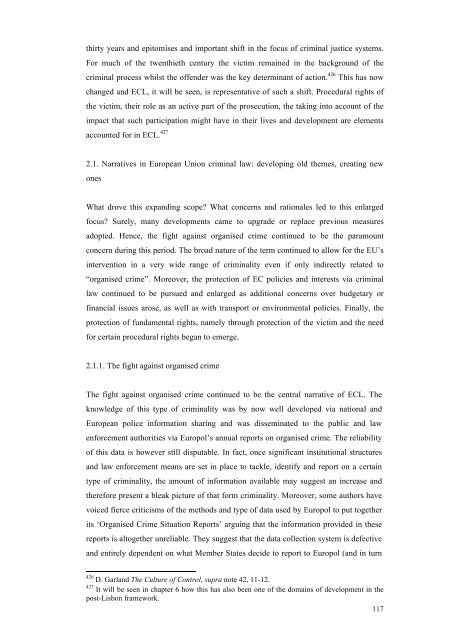The evolution of European Union criminal law (1957-2012)
The evolution of European Union criminal law (1957-2012)
The evolution of European Union criminal law (1957-2012)
You also want an ePaper? Increase the reach of your titles
YUMPU automatically turns print PDFs into web optimized ePapers that Google loves.
thirty years and epitomises and important shift in the focus <strong>of</strong> <strong>criminal</strong> justice systems.<br />
For much <strong>of</strong> the twenthieth century the victim remained in the background <strong>of</strong> the<br />
<strong>criminal</strong> process whilst the <strong>of</strong>fender was the key determinant <strong>of</strong> action. 426 This has now<br />
changed and ECL, it will be seen, is representative <strong>of</strong> such a shift. Procedural rights <strong>of</strong><br />
the victim, their role as an active part <strong>of</strong> the prosecution, the taking into account <strong>of</strong> the<br />
impact that such participation might have in their lives and development are elements<br />
accounted for in ECL. 427<br />
2.1. Narratives in <strong>European</strong> <strong>Union</strong> <strong>criminal</strong> <strong>law</strong>: developing old themes, creating new<br />
ones<br />
What drove this expanding scope What concerns and rationales led to this enlarged<br />
focus Surely, many developments came to upgrade or replace previous measures<br />
adopted. Hence, the fight against organised crime continued to be the paramount<br />
concern during this period. <strong>The</strong> broad nature <strong>of</strong> the term continued to allow for the EU’s<br />
intervention in a very wide range <strong>of</strong> <strong>criminal</strong>ity even if only indirectly related to<br />
“organised crime”. Moreover, the protection <strong>of</strong> EC policies and interests via <strong>criminal</strong><br />
<strong>law</strong> continued to be pursued and enlarged as additional concerns over budgetary or<br />
financial issues arose, as well as with transport or environmental policies. Finally, the<br />
protection <strong>of</strong> fundamental rights, namely through protection <strong>of</strong> the victim and the need<br />
for certain procedural rights began to emerge.<br />
2.1.1. <strong>The</strong> fight against organised crime<br />
<strong>The</strong> fight against organised crime continued to be the central narrative <strong>of</strong> ECL. <strong>The</strong><br />
knowledge <strong>of</strong> this type <strong>of</strong> <strong>criminal</strong>ity was by now well developed via national and<br />
<strong>European</strong> police information sharing and was disseminated to the public and <strong>law</strong><br />
enforcement authorities via Europol’s annual reports on organised crime. <strong>The</strong> reliability<br />
<strong>of</strong> this data is however still disputable. In fact, once significant institutional structures<br />
and <strong>law</strong> enforcement means are set in place to tackle, identify and report on a certain<br />
type <strong>of</strong> <strong>criminal</strong>ity, the amount <strong>of</strong> information available may suggest an increase and<br />
therefore present a bleak picture <strong>of</strong> that form <strong>criminal</strong>ity. Moreover, some authors have<br />
voiced fierce criticisms <strong>of</strong> the methods and type <strong>of</strong> data used by Europol to put together<br />
its ‘Organised Crime Situation Reports’ arguing that the information provided in these<br />
reports is altogether unreliable. <strong>The</strong>y suggest that the data collection system is defective<br />
and entirely dependent on what Member States decide to report to Europol (and in turn<br />
426 D. Garland <strong>The</strong> Culture <strong>of</strong> Control, supra note 42, 11-12.<br />
427 It will be seen in chapter 6 how this has also been one <strong>of</strong> the domains <strong>of</strong> development in the<br />
post-Lisbon framework.<br />
117
















